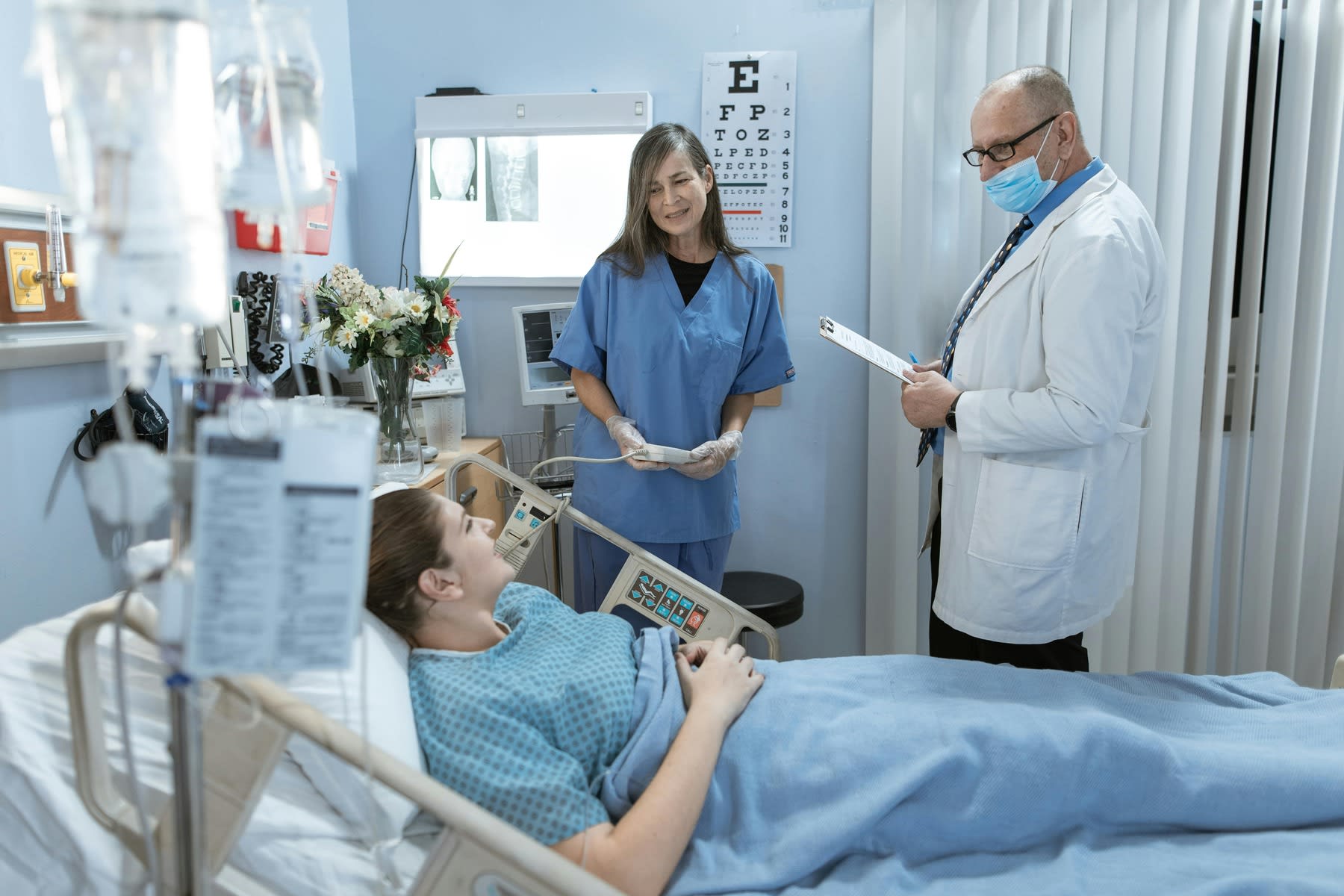Best Specializations for BSN Students 2025

Key Takeaways
- Critical care nurses, pain management nurses, and psychiatric mental health nurses are among the best paid nursing specialty fields.
- Critical care nursing and emergency nursing are among the most challenging specialties.
- A nursing specialization that aligns with a student’s interests and career goals can lead to higher salaries and increased job satisfaction.
Best Colleges for Specializations for BSN in 2026
2025 Ranking Update
Our Influence Ranking Engine™ leverages machine learning to track the real-world influence of colleges and universities over time. Below you’ll see which schools gained or lost ground for the 2025 school year.
In 2025, the top schools in our ranking of the colleges with the best specializations for BSN students saw considerable changes in ranking positions. The University of Michigan was able to rise to the top ranking position as the university expanded their Nursing Simulation and Clinical Learning Center, which now features advanced simulation technology, allowing students to practice real-life scenarios in a controlled environment. Additionally, U-M has integrated new courses in telemedicine and digital health, preparing BSN students for the growing demand in virtual healthcare services.
The university has also strengthened its partnerships with local hospitals, providing more internship and clinical rotation opportunities, ensuring that students gain hands-on experience in diverse healthcare settings. These updates enhance practical training and prepare nursing students for modern healthcare challenges.
Due to the sheer number of specializations, many students feel overwhelmed by the thought of enrolling in a bachelor of science in nursing (BSN) program. However, there’s a silver lining - there’s something for everyone! In this article, we’ll discuss the best specializations for BSN students and the career prospects they offer.
Best Specializations for BSN Students
With the healthcare industry expected to grow rapidly, specialized nurses will be in high demand. The Bureau of Labor Statistics reports a 6% growth in nursing jobs from 2022 to 2032. With a BSN specialization, nurses can acquire the skills and knowledge to take advantage of the emerging job opportunities.
| Specialization | Average Annual Salary |
|---|---|
| Critical Care Nursing | $100,392 |
| Pediatric Nursing | $67,332 |
| Nurse Anesthetist | $214,240 |
| Nurse Educator | $83,948 |
| Public Health Nursing | $72,314 |
| Psychiatric Mental Health Nursing | $119,840 |
| Pain Management Nursing | $112,250 |
| Informatics Nursing | $84,433 |
| Perioperative Nursing | $81,920 |
| Dialysis Nursing | $81,329 |

Critical Care Nursing
Critical care nursing involves treating patients with severe, life-threatening conditions. ICU nurses are responsible for assessments, treatments, and monitoring patients’ vitals and condition. They provide specialized care and quick responses to emergencies.
Many choose this field for the challenging and rewarding nature of the work, where they can significantly impact patients’ lives. The average annual salary of critical care nurses is $100,392. This signifies the value of their specialized skills and the demanding nature of the job.
Pediatric Nursing
Pediatric nurses care for children from infancy through adolescence. They face unique challenges, such as communicating with young patients who may not understand their conditions. Pediatric nurses need patience, empathy, and strong communication skills. They must also be knowledgeable about child-specific medical issues.
Specializing in pediatric nursing offers professional benefits. These include job stability and personal rewards for making a difference in children’s lives. The average annual salary for pediatric nurses is about $134,328. This specialization allows nurses to contribute to children’s health.
Nurse Anesthetist
Nurse anesthetists administer anesthesia during surgeries, ensuring patient safety and comfort. They monitor vital signs and administer anesthesia during surgeries and other medical procedures. To become a nurse anesthetist, you must:
- Complete a bachelor’s degree in nursing
- Obtain a registered nurse (RN) license
- Gain critical care experience
- Earn a master’s or doctoral degree in nurse anesthesia
This specialization offers strong job prospects and high earning potential, with the median annual salary starting from $212,650.
Nurse Educator
Nurse educators play a vital role in training future nurses. They teach nursing students in classrooms and clinical settings, ensuring they gain the necessary knowledge and skills. To become a nurse educator, a master’s or doctoral degree in nursing and clinical experience are required.
Important skills for this role include:
- Strong communication
- Patience
- Ability to mentor students
Nurse educators can also become administrators or policymakers. According to PayScale, the average salary for nurse educators is $83,948.
Public Health Nursing
Public health nursing is about helping people stay healthy in their communities. Nurses work with groups in neighborhoods or schools to prevent diseases and promote wellness. They focus on educating people and providing healthcare where they live.
Public health nurses track health trends, offer vaccinations, and organize health programs. They play a vital role in improving the health of entire populations. Working in this field is rewarding as it allows nurses to make a real difference in people’s lives. On average, public health nurses earn about $72,314 per year.
Psychiatric Mental Health Nursing
Psychiatric mental health (PMH) nurses support individuals with mental health issues. They assess symptoms, develop treatment plans, and conduct psychosocial evaluations. PMH nurses work in:
- Hospitals
- Schools
- Community health centers
- Substance use treatment programs
PMH nurses contribute to patients’ mental well-being and quality of life with their expertise. According to PayScale, PMH nurses earn an average annual salary of $119,840. This reflects the importance and demand for their specialized skills in mental health care.

Pain Management Nursing
Pain management nurses help assess and treat patients’ pain. They work in hospitals, clinics, and rehab centers, relieving pain for various conditions. Their job involves evaluating pain levels, devising treatment plans, and administering medications. Pain management nurses also educate patients and families about pain management techniques.
They are employed in hospitals, clinics, physicians’ offices, rehabilitation centers, and therapy centers. The demand for pain management nurses is growing, providing stable job prospects. The typical salary for this specialization is around $112,250, highlighting the demand for this profession.
Informatics Nursing
Informatics nursing combines nursing with technology to improve patient care. Nurses in this role manage data, analyze information, and train staff on technology. They assure accurate record-keeping and use data to enhance patient outcomes.
Informatics nurses work in various settings, including hospitals, clinics, and telehealth services. They enjoy job satisfaction and have opportunities for remote work. Due to the growing demand for this profession, informatics nurses earn approximately $84,433.
Perioperative Nursing
Perioperative nurses care for patients before, during, and after surgery. They work in operating rooms as circulating nurses. They prepare patients for procedures, ensuring they understand what to expect. After surgery, perioperative nurses monitor patients’ recovery and address any concerns.
Career opportunities for perioperative nurses are diverse, with jobs in
- Hospitals
- Surgical centers
- Other healthcare facilities
The job outlook for perioperative nurses is promising, with a growing demand and an average annual salary of $81,920. This field offers a rewarding career path for those passionate about surgical patient care.
Dialysis Nursing
Dialysis nurses play a vital role in helping patients with kidney problems. They take care of patients during dialysis treatment. This involves overseeing the dialysis equipment to assure proper function. They also monitor the patient’s health during the treatment.
Dialysis nurses educate patients and families about kidney disease. They also form close, rewarding relationships with them. Since kidney disease is common, there is a high demand for dialysis nurses. On average, dialysis nurses earn $81,329 annually, making it an attractive career option.
Best Colleges for BSN Specialization
If you’re confident about pursuing a BSN specialization, you must thoroughly research the institutions offering this program. In the US, some universities stand out for their nursing programs and are known for offering a strong and solid foundation to students.
Below are the top colleges that provide in-demand BSN specializations.
- #2 50 Best Public Colleges and Universities Ranked for Students in 2025 #2 50 Best Public Grad Schools 2025 #2 Best Value Colleges and Universities Ranked for Students in 2025 #4 Top Schools that Offer Free Master's Degrees Online
Tuition + fees
$18K
Acceptance
18%
Graduation
93%
Student body
52K
Median SAT/ACT
1440/32
Career Outlook for Nursing degree at University of Michigan
Cost of Degree: $18,309Expenses: $17,554Starting Salary: $127,147Cost Recoup Time: 10 yearsPaid back at 15% of annual salaryOverview of the University of Michigan School of Nursing
- Strong emphasis on both foundational and advanced nursing skills
- Provides numerous opportunities for interdisciplinary studies
- Boasts a robust alumni network and connections to leading healthcare institutions
What do we love about the University of Michigan School of Nursing?
The University of Michigan School of Nursing prepares competent practitioners for the complexities of healthcare. Its rigorous curriculum and focus on interdisciplinary learning assure that graduates are agile and can adapt to various roles in healthcare settings.
- University of Michigan School of Nursing is great for students who: Want a comprehensive nursing education with a strong foundation in practical skills.
- University of Michigan School of Nursing might not be the best fit for students who: Wish to attend a school with less emphasis on research and more focus on local community engagement.
- #5 Top Schools that Offer Free Master's Degrees Online #10 50 Best Private Grad Schools 2025 #10 50 Best Private Colleges and Universities for Undergrads 2025 #10 50 Best Research Universities Ranked for Undergrads in 2024
Tuition + fees
$63K
Acceptance
7%
Graduation
96%
Student body
33K
Median SAT/ACT
1535/34
Career Outlook for Nursing degree at University of Pennsylvania
Cost of Degree: $66,104Expenses: $22,924Starting Salary: $197,151Cost Recoup Time: 13 yearsPaid back at 15% of annual salaryOverview of University of Pennsylvania School of Nursing
- Consistently ranked among the top nursing schools in the nation
- Offers a plethora of advanced specialties in nursing
- Boasts impressive research facilities and opportunities
What Do We Love About the University of Pennsylvania School of Nursing?
Penn Nursing has a strong emphasis on research, interdisciplinary collaboration, and clinical practice. It provides students with state-of-the-art facilities and access to some of the most respected faculty in the nursing field. Students engage in hands-on experiences that prepare them for real-world challenges in healthcare.
- University of Pennsylvania School of Nursing is great for students who: Are looking for a program with extensive research opportunities and collaboration with healthcare professionals.
- University of Pennsylvania School of Nursing might not be the best fit for students who: Prefer a smaller, more intimate campus experience or lower tuition costs for a nursing degree.
- #11 50 Best Private Grad Schools 2025 #11 50 Best Private Colleges and Universities for Undergrads 2025 #11 50 Best Research Universities Ranked for Undergrads in 2024 #14 50 Best Colleges and Universities Ranked for Undergrads in 2026
Tuition + fees
$60K
Acceptance
7%
Graduation
94%
Student body
40K
Median SAT/ACT
1545/34
Career Outlook for Nursing degree at Johns Hopkins University
Cost of Degree: $62,840Expenses: $22,725Starting Salary: $133,781Cost Recoup Time: 16 yearsPaid back at 15% of annual salaryOverview of Johns Hopkins University School of Nursing
- Known for its pioneering research and innovation in nursing education
- Provides a global perspective on healthcare through various international programs
- Boasts a high NCLEX pass rate for graduates
What do we love about Johns Hopkins University School of Nursing?
Johns Hopkins University School of Nursing excels in integrating research, education, and practice. The nursing program is designed for ambitious students who aspire to become leaders in the healthcare field. Nursing students with a global approach can lead health innovation and policy development.
- Johns Hopkins University School is great for students who: Aim to take on leadership roles and want a globally-oriented nursing career.
- Johns Hopkins University School might not be the best fit for students who: Prefer a focus on local community healthcare over international perspectives.
- #1 Best Online Christian Colleges and Universities for Doctoral Degrees 2026 #1 50 Best Christian Colleges and Universities 2024 #6 Top Schools that Offer Free Master's Degrees Online #13 50 Best Private Grad Schools 2025
Tuition + fees
$63K
Acceptance
6%
Graduation
97%
Student body
18K
Median SAT/ACT
1530/34
Career Outlook for Nursing degree at Duke University
Cost of Degree: $65,805Expenses: $21,267Starting Salary: $171,533Cost Recoup Time: 14 yearsPaid back at 15% of annual salaryOverview of the Duke University School of Nursing
- Home to a diverse and inclusive academic community
- Offers unique accelerated and bridge programs for varying educational backgrounds
- Boasts a high level of faculty engagement in student development
What do we love about Duke University School of Nursing?
Duke University School of Nursing offers diverse curriculum options and a strong student support system. The school is committed to innovation in the healthcare field and encourages students to participate in research initiatives. The faculty is involved in the academic and professional advancement of their students.
- Duke University School of Nursing is great for students who: Desire a variety of program options and a high level of mentorship from faculty.
- Duke University School of Nursing might not be the best fit for students who: Prefer a less competitive and fast-paced academic environment.
Student body
3K
Career Outlook for Nursing degree at University of California, San Francisco
Starting Salary: $252,364Overview of the University of California, San Francisco School of Nursing
- Offers a comprehensive curriculum with a focus on clinical practice
- Faculty includes notable leaders in nursing and healthcare policy
- Located in a hub for biotechnology and medical research
What do we love about the University of California, San Francisco School of Nursing?
University of California, San Francisco (UCSF) School of Nursing is known for its clinical focus. It also offers close proximity to many healthcare facilities, including UCSF Health. The school offers students a comprehensive education and extensive hands-on training. This module prepares students for a career in nursing.
- UCSF School of Nursing is great for students who: Seek rigorous clinical experience complemented by a strong theoretical foundation in nursing.
- UCSF School of Nursing might not be the best fit for students who: Are looking for a campus with traditional college life since UCSF is a graduate healthcare sciences university.


Tips for Choosing the Right BSN Specialization
Choosing the right specialization is important for BSN students. It can affect how satisfied you are with your career and how much you can grow. Below are a few tips to help you select the right specialization:
Understanding Personal Interests and Strengths
Self-assessment is vital in choosing a nursing specialty. Students must reflect on the clinical experiences and courses that sparked excitement. A strong connection to one’s interests and strengths can result in long-term career fulfillment.
Researching Specializations
Students must thoroughly research potential nursing specializations. Reliable sources of information include professional nursing associations, academic advisors, and online forums. Understanding the details of daily tasks, settings, and patient demographics is important.
Job Market and Career Prospects
Evaluating the demand for different nursing specializations is a key step. The job outlook and potential earnings can steer a student’s choice. Additionally, consider how geographic location plays a role in job availability.
Related Questions
What are the highest-paid BSN specialties?
Nurse anesthetists and critical care nurses are among the highest paid positions in this profession. Nurse anesthetists earn $160,000 to $200,000 annually due to the complexity of administering anesthesia. Critical care nurses earn $70,000 to $100,000 because of the demanding nature of their work in intensive care settings.
Which course is best after BSN?
After getting a BSN degree, you can enroll in a master of science in nursing (MSN) for advanced practice and leadership roles. The doctor of nursing practice (DNP) paves the way for the highest levels of clinical practice.
Popular certifications in this field include certified pediatric nurse (CPN) and oncology certified nurse (OCN), which can enhance job prospects and prove advanced competency in specialized fields.
Which nursing specialty is hardest?
Critical care nursing and emergency nursing are among the most challenging specialties. These roles involve working in high-stress environments, quick decision-making, and caring for patients with life-threatening conditions.
Conclusion
With the increasing demand for specialized nurses, it’s beneficial for BSN students to pick a nursing major and specialization that aligns with their interests and career goals. By choosing a specialization, you’re embarking on a journey that leads to higher remuneration and increased job satisfaction. Students should spend some time considering their options to make an informed decision.